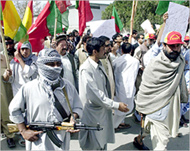Pakistan boosts Afghan border security
Security is being tightened on both sides of the Afghan-Pakistani border as fears rise that rebels are plotting to disrupt Afghanistan’s legislative elections in two weeks, officials say.

As Pakistan on Tuesday sent 9500 more troops to the border to prevent rebel infiltration, elsewhere in the country, a policeman was killed in Quetta, southwest Pakistan, when he came under tribal attack.
On Monday, Afghan and US-led coalition forces said they had killed 12 suspected rebels in raids on hideouts – allegedly to be used as staging bases for attacks – in southern Afghanistan’s Zabul province.
Police said they uncovered a bomb-making factory in the southern Kandahar area. Attacks have recently increased on US led coalition and Afghan forces in Afghanistan.
The violence has left more than more than 1100 people dead, many of them rebels, in the past six months.
Pakistan, a key US ally in the war on terror, has about 80,000 forces at the border. Taliban-led rebels, hoping to disrupt the 18 September elections, are believed to have sought sanctuary in Pakistan’s tribal regions.
Pakistan army spokesman Major General Shaukat Sultan said 5000 additional forces have been deployed in the northwest and 4500 in southwestern Baluchistan province.
Trilateral review
The deployment was completed after a 28 August meeting in Islamabad of senior military commanders from Pakistan, Afghanistan and the United States to review security for the Afghan vote, Sultan said.
Sultan said Pakistan has set up 40-50 mobile checkpoints and sent six transport helicopters and three helicopter gunships to the frontier “to beef up security and curtail activities of miscreants”.
|
“We were engaged as soon as we got off the helicopters. We returned fire, and the enemy fell, one by one” Sergeant Major Bradley Meyers, US Army |
Pakistani officials often use the term ‘miscreants’ to describe rebels. A similar clampdown by Pakistani forces on the border area ahead of Afghan presidential elections in October was credited with decreasing rebel activity inside Afghanistan. That vote was relatively peaceful.
Sultan said the Pakistan army’s Quick Action Force would stay in the tribal regions, and authorities have started imposing a dusk-to-dawn curfew for people living within two kilometers of the border.
US action
The raids in Zabul led to the detention of nine suspected insurgents, the US military said.
“We were engaged as soon as we got off the helicopters,” Sergeant Major Bradley Meyers, from the 2nd Battalion 503rd Infantry (Airborne), was quoted as saying. “We returned fire, and the enemy fell, one by one.”
Coalition warplanes and attack helicopters took part in the fighting, the military said. After the battle, troops found bomb-making materials at the site.
The Afghan and coalition forces reported no casualties. The fighting came a day after 13 suspected rebels were killed in southern Kandahar province during raids to flush them from a mountain stronghold.
Bomb-making factory
 |
|
In Quetta, tribe members demanded |
Kandahar police discovered a bomb-making factory on Tuesday that was hidden inside a massive plastic water tank, said provincial police chief Abdul Malik Khan.
About 300kg of explosives, timers and other equipment were found, he said.
It was not immediately clear whether anyone was arrested.
Meanwhile, in Quetta, southwestern Pakistan, supporters of a tribal chief – demanding his release from custody – lobbed two grenades and opened fire at police during a protest, killing one officer and injuring 20 others, an official said.
Tribal attack
Five tribesmen were also injured when police returned fire and hurled tear gas shells in a street in Quetta, capital of Baluchistan province, police official Pervez Zahoor said.
About 70 tribesmen had blocked the street, and some threw grenades and opened fire when police arrived to disperse them, Zahoor said.
The police officer died at the scene, while the others suffered shrapnel and bullet wounds, he said.
The five injured tribesmen were moved to a Quetta hospital under police custody, Zahoor said. There was no word on their conditions.
The tribal chief, identified as Abdul Wadood Raisani, was arrested on Monday on fears that his meddling in local tribal politics in his hometown of Mastung, about 40km south of Quetta, could disturb the peace, according to Zahoor.